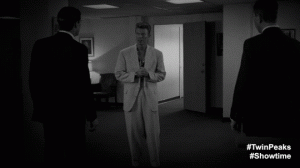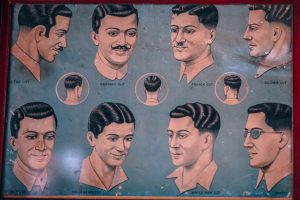Jeff Somers, International Man of Ignorance

FRIENDS, I am not a particularly bright or capable man. Once, when attempting to earn my Cooking merit badge in the Boy Scouts, I cooked an entire package of hot dogs before realizing they were individually wrapped in plastic of some sort. Once, when driving a rental truck and helping some friends move, I engaged in a series of slow-motion maneuvers that resulted in $2,000 in damage to the truck despite the fact that I was never going more than 5 MPH. Once, when I was in 7th Grade, I was convinced by my teachers to wear ladies pantyhose for a performance in The Taming of the Shrew … and allowed myself to be filmed[1].
None of these failures, however, has ever been quite as total and complete as my attempts to learn a second language.
Mi Llamo es Gofredo
I blame my Sophomore Year Spanish teacher, who convinced me that my name in Spanish would be Gofredo. Sure, it’s a variation of Jeffrey, and yes, it is Spanish in origin. But teaching me to say Mi llamo es Gofredo! instead of just Mi nombre es Jeff set me up for failure and humiliation.
Now, I’m not a traveler. In fact, I hate travel. If I could I would live my life inside a virtual reality box, growing large and mushroom-like and never actually interacting with real, actual human beings, because real, actual human beings are awful. But I married The Duchess, who has not heard of a country she does not want to explore. Here’s a real, actual conversation:
DUCHESS: Oooh, Syria, sounds exotic! Let’s go there next year.
ME: <horrified>
So I know I am doomed to travel the world until the sweet release of death, and I am determined to do so with a modicum of class. So I have a rule. Or, more accurately, I attempt to have a rule: When I travel to another country I must at least make a sincere effort to learn the local language. So, for example, when The Duchess insisted on a trip to Italy a few years ago I made a concerted effort over the course of a few months to learn Italian. Upon arriving in Italy, I attempted to speak Italian many times, and was met with, in descending order of frequency: Amusement, irritation, complete lack of comprehension, and violence. There are basically two possible scenarios:
SCENARIO ONE:
ME: <something vaguely Italian-ish>
ITALIAN PERSON: … we speak English, yes?
SCENARIO TWO:
ME: Ciao! Mi chiamo Jeff.
THEM: <rapidly> Ah, parli italiano! È fantastico! Dimmi, come ti piace l’Italia finora? Da dove vieni in America? Inoltre, perché non indossi i pantaloni?
ME: <feigns seizure, falls down, lies very still until everyone leaves>
Since my inability to learn a foreign language hasn’t been due to a lack of effort, I can only conclude that I am dumb. Which doesn’t really surprise a very large number of people who have interacted with me during my lifetime.
Go Along to Get Along
This all wouldn’t be so bad except for the fact that I am a non-confrontational, go-along-to-get-along kind of guy. Which means that I always prefer to pretend I understand what’s happening around me even if I am alarmed and confused by events. I’ve tried being a better person, but I always fall into the same trap:
ITALIAN PERSON: <in Italian> This is not the museum. People are often confused. This is a bondage club and you will immediately be bound and gagged upon entry.
JEFF: <not understanding a word> Cool, cool. <enters house, is never seen again>
Of course, when you behave a stupidly as this because you can’t abide anyone thinking you don’t understand everything perfectly, you more or less deserve what you get.
The one upside to this is that when I meet people here in the States who struggle to make themselves understood with ESL, I am more than sympathetic. Even if your English is tortured and broken, I am impressed, because I can’t even make myself understood in a second language at all. In this way my own failings have made me an incrementally better person.
Luckily, no matter where you go you don’t need words to order booze. They just take one look at my jaundiced complexion and bloodshot eyes and direct me to the local imbibery.
[1] If this video exists, my life as I know it is over.





 When it comes to television, The Duchess and I have very low standards. We’re talking The Ranch on Netflix low. I will not apologize.
When it comes to television, The Duchess and I have very low standards. We’re talking The Ranch on Netflix low. I will not apologize.
 One of the double-edged aspects of streaming services like Netflix is the fact that, in a sense, you’ve pre-paid for all the content it offers. That often means that when you stumble on some piece of obvious trash—like, say, The Cloverfield Paradox—at 1AM, the bar for pressing select is pretty low. After all, you’ve already paid for it, and you’re obviously looking to waste some of your life. And hey, every bad movie or TV show you watch actually amortizes the amount of money you spent on each bit of media. You have a duty to watch moar.
One of the double-edged aspects of streaming services like Netflix is the fact that, in a sense, you’ve pre-paid for all the content it offers. That often means that when you stumble on some piece of obvious trash—like, say, The Cloverfield Paradox—at 1AM, the bar for pressing select is pretty low. After all, you’ve already paid for it, and you’re obviously looking to waste some of your life. And hey, every bad movie or TV show you watch actually amortizes the amount of money you spent on each bit of media. You have a duty to watch moar. My wife, The Duchess, often gets irritated with me due to my reaction to celebrity sightings. We live near New York City, and are frequently there, so there’s a non-zero chance we’ll run across a famous person. When we do, invariably The Duchess doesn’t notice but I do, and my reaction is to wait about three blocks and then whisper to her that someone famous was hailing a cab or being raptured or something back there. The Duchess curses my name, turns, and races back to see if she can still see them.
My wife, The Duchess, often gets irritated with me due to my reaction to celebrity sightings. We live near New York City, and are frequently there, so there’s a non-zero chance we’ll run across a famous person. When we do, invariably The Duchess doesn’t notice but I do, and my reaction is to wait about three blocks and then whisper to her that someone famous was hailing a cab or being raptured or something back there. The Duchess curses my name, turns, and races back to see if she can still see them.

